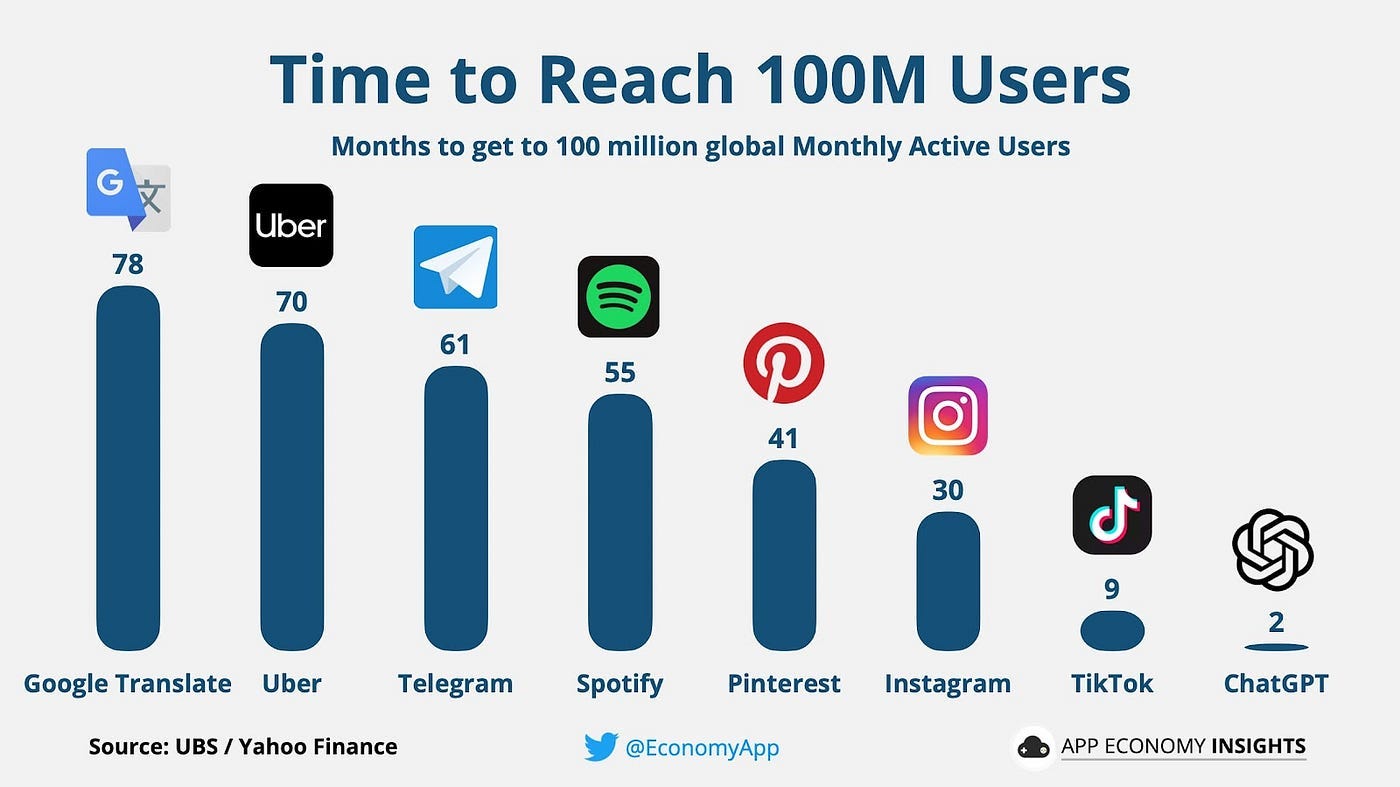How Strategy Can Help Us Navigate The Awesome Creation & Destruction Generative AI Has Already Unleashed
Tech has upended things before. Strategy can help us prepare.
“Despite its hype, I wouldn’t bet on blockchain coming out of its “Trough of Disillusionment” anytime soon, if ever. Because ultimately, it’s remained just a “cool” piece of technology still looking for a real customer problem to solve.”
This is an unprecedented moment as several technologies have matured and converged to give us “Artificial General Intelligence,” (what OpenAI calls “AGI”) giving us a front-row seat at this critical inflection point.
The wide-ranging impacts have only just begun. When the dust finally settles, I think the landscape will shift in many ways from what it is now.
It’s often said that Generative AI won’t put people out of work. They’ll be put out of work by other people who are using Generative AI.
And for anyone who’s used ChatGPT or Midjourney, that’s immediately clear: Generative AI on its own does nothing, and if you don’t put work into learning and upskilling into how to prompt it correctly, the results it gives are pretty useless.
The people who will own the future will be those who can identify the right product for the right application, and prompt it skillfully.
Upstream from that, the Product Manager of the future will develop a broad working knowledge of AGI, together a deep knowledge of their target customer’s problems. Coupled with capability and skill around facilitating collaborative strategy design they can evolve strategies that will them to discover and deliver better ways to put AGI technology to bear to solve those problems. This will lead to the next generation of applications that will create ever-more powerful “human+machine” multiplier effects.
In this edition:
Making sense of Generative AI Hype
Marty Cagan on “The Role of Technology”
OpenAI’s plan for AGI –”Artificial General Intelligence”
How AI will change your industry and your job
Let’s jump in!
Study Strategy to Navigate the Generative AI Hype Cycle and Avoid FOMO
How to separate noise from signal and put new technologies in context

Back when I lived and worked in Japan in the hotel industry in the 90’s, I can distinctly remember that moment in 1994 when I joined my first Internet forum and started exchanging emails from my Apple PowerBook 180c.
In an instant, it became stunningly clear to me that the Web would transform the world, and I had to be part of it.
As millions gradually moved their work, play, and social activities to the Web through the late 90’s, I saw two contrasting viewpoints emerge:
Established businesses and Enterprises dismissed it as a “waste of time,” only good for geeks, and unfit for “real” business
Another group saw the potential of the Web as a great way to “cash in.” Hyping it as “Business 2.0,” they claimed the established rules of income and profit no longer applied, and all anyone needed was a website to unlock endless riches as long as you followed their advice.
The Internet hype reaches its peak
After moving back to New York later in the 90’s, I watched as the hype group grew in size, noise and power, selling more and more services of varying quality and credibility as businesses looked to migrate to the Internet.
Things eventually got so overheated in New York’s “Silicon Alley” that as long as you knew some basic HTML and could “fog a mirror,” you could get a high-paying job in the “Digital Gold Rush.”
And these were the kinds of “Internet consultants” many businesses were paying top dollar for.
Rude awakenings
After 9/11 (I was at the Twin Towers that day, but that’s another story), the inevitable downturn of the Internet hype cycle crashed into some other hard realities.
Suddenly everyone’s high hopes for the Internet and almost everything elsevanished overnight, and the big correction came.
It turned out sham Web 2.0 businesses that burned through billions of investor money like Pets.com and Webvan.com couldn’t “reinvent the physics of business” after all.
What was really interesting to me was how much bad advice established big consultancies dished out to their clients while cashing in fat paychecks and suffering no backlash themselves.
In one infamous example, strategy consultancy McKinsey advised AT&T cellphones would never amount to more than a niche for geek enthusiasts, causing AT&T to lose crucial early ground in the nascent technology.
Excessively Under-, Then Over-Hyped
So I saw that most business people had gotten the Web all wrong:
Too many had overly undervalued its transformative power for far too long, until it made their businesses obsolete
But many others had excessively over-hyped it once they saw it as a way to cash in by playing on people’s natural “Fear of Missing Out” (“FOMO”)
Consultancies became like the “house” in a Vegas casino, playing both sides, while all the while raking in sky-high fees regardless of the consequences of their bad advice.
The next wave of peak tech hype — Generative AI
Depending on when you’re reading this, as of September 2023, it seems we’re seeing a very similar cycle play out all over again in the current fever pitch around Generative AI.
Even Alphabet CEO Sundar Pichai got swept up in his own “AI mania” at Google’s recent I/O conference:
And Gartner has officially placed Generative AI at “peak” on its “hype” scale.
Hype aside…
But what does Generative AI really mean for you, your company, and your products & services?
Is your leadership oblivious and fearful, hoping it will go away?
Are or are they experiencing their own “FOMO,” putting pressure on you to immediately adopt Generative AI in some form, and looking for answers in the wrong places?
Most importantly, what will Generative AI mean for your industry and your customers in the future?
Read the full story on Medium here.
Marty Cagan on the “Role of Technology”
As valid today as 3 years ago, Marty Cagan over at Silicon Valley Product Group shared these thoughts on the fundamental divide in how different organizations view technology:
“Marc Andreessen published what I consider one of the most important essays of our time, Why Software Is Eating the World. He described why he believed that technology was about to cause major disruption across virtually every industry.
Marc gave voice to what I had been seeing in my work, primarily with the disruptors, but occasionally with those under threat of disruption.
Ten years later, he was remarkably prescient.
That said, most companies seem to have not really understood his warnings.
Yes, they’re all spending more on software now.
Yes, they’ve (mostly) moved to Agile methods.
But most have not transformed in any meaningful sense, and in particular, most have not embraced technology as the business enabler it is.”
Similar to this piece I wrote recently on the “ROI of UX,” Marty notes the destructive downstream ramifications of separating “The Business” from “IT.”
Ultimately, technology gets treated as just another “Cost Center,” “overhead,” or a “necessary evil,” rather than the powerful strategic lever it can provide.
Read the full piece on the SVPG blog here.
OpenAI’s Plan for AGI
Sam Altman, CEO of OpenAI made some important changes to his plans for the future of AGI.
This quote stuck out for me, and reemphasizes the important role strategy will play in navigating any new technology:
“We currently believe the best way to successfully navigate AI deployment challenges is with a tight feedback loop of rapid learning and careful iteration. Society will face major questions about what AI systems are allowed to do, how to combat bias, how to deal with job displacement, and more. The optimal decisions will depend on the path the technology takes, and like any new field, most expert predictions have been wrong so far. This makes planning in a vacuum very difficult.”
Read the full piece on the OpenAI blog here.
How to respond to AGI’s changes to your industry and your job
Tracy Brower, PhD over at Steelcase shared a well-researched piece recently over on Forbes.
She goes into some interesting details on where and how our work lives will shift with the impact of AGI, and potential strategies how you can respond to stay ahead of the curve.
“If you’re worried about AI and its affect on your work, your industry and your future, you’re right to be concerned. AI will shift things fundamentally—including the content of work, the work available and who’s doing it. And the changes will impact work differently than technology advancements of the past—with greater effects on knowledge work than ever before.
But you can get over your anxiety and succeed in the new landscape. You’ll need to be aware, ready and responsive to what’s coming. And new data can show you where to look, which signals to watch and how to stay ahead of the coming wave affecting work.”
Read the full story on Forbes here.
That wraps it up for this edition!
Join me next time as we continue to go upstream and use strategy, goal-setting, and product management to make you more effective.



